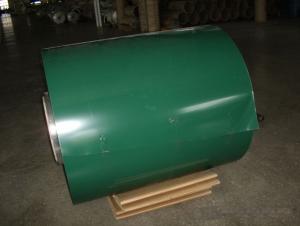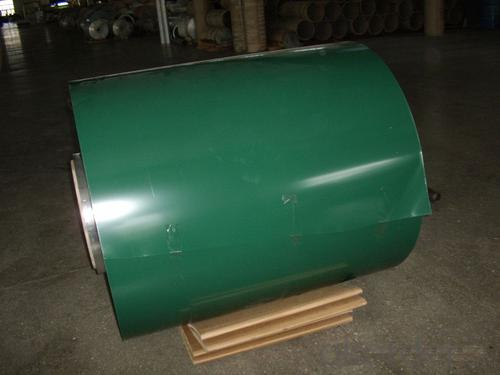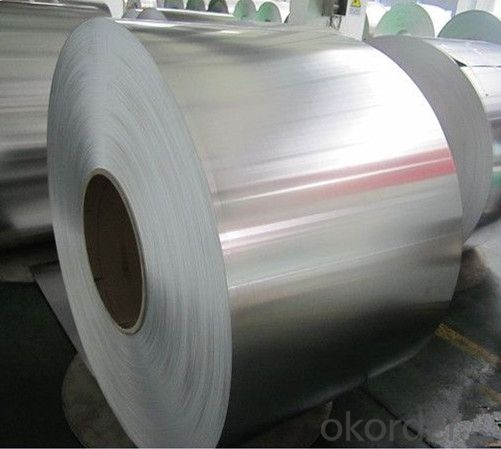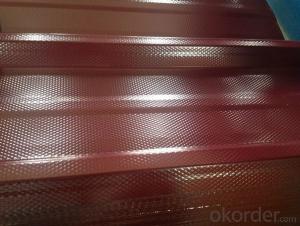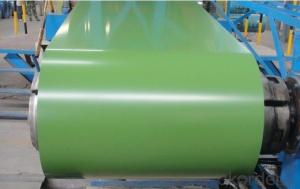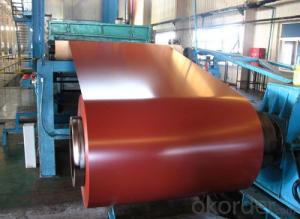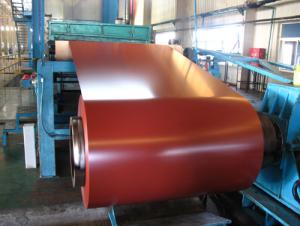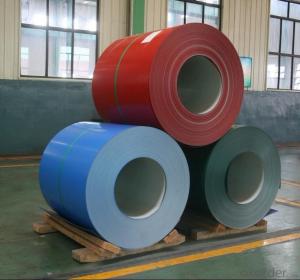Hvac Aluminum Coils for Table Panel - Color Coated Aluminium Coil
- Loading Port:
- Shanghai
- Payment Terms:
- TT OR LC
- Min Order Qty:
- 3 m.t.
- Supply Capability:
- 60000 m.t./month
OKorder Service Pledge
OKorder Financial Service
You Might Also Like
Specification
Color Coated Aluminium Coil For Table Panel
Description
Alloy | 1060, 1100, 3003, 8011, etc. |
Temper | H16, H18, H24, H26, H28 |
Thickness | From 0.05mm to 3.0mm |
Width | Standard width:1240mm |
Special width:1300mm, 1520mm, 1570mm, 1595mm | |
Diameter | Standard dia:1200mm |
Interior dia:150mm,405mm,505mm | |
Weight | 2.5 T/coil,3.0 T/coil |
Coating | PE, PVDF, ACRYLIC |
Surface | Embossed, mill finish, coated |
Color | AS to code RAL |
Gloss | 10-90%(EN ISO-2813:1994) |
Coating Thickness | PE: more than 18 micron |
PVDF: more than 25 micron | |
Coating Hardness(pencil resistance) | More than 2h |
Coating adhesion | 5J (EN ISO-2409:1994) |
Impact Resistance | No peeling or cracking(50 kg/cm,ASTMD-2794:1993) |
Flexibility(T-bend) | 2T |
MEK resistance | More than 100 |
Advantage | 1.High temperature resistant 2.Weathering resistant 3.Scrubbing resistant 5.Acid or alkali proof 6. Fireproof 7.Light weight material is easy to construct and install |
Out package | Wooden splint with export standard |
Application | ACP, wall cladding, facades, roofs and canopies, ceilings, signboards, blind window, display platforms, electrical panels, etc |
Manufacturing
Decoiler → Accumulator →Tension Leveler →Acid & Alkali Cleaner → Rinse →Conversion Treatment → Priming coater →Infrared Curing Oven →Main coater →Floatation Curing Oven →Strippable Film Applicator → Exit Accumulator → Recoiler
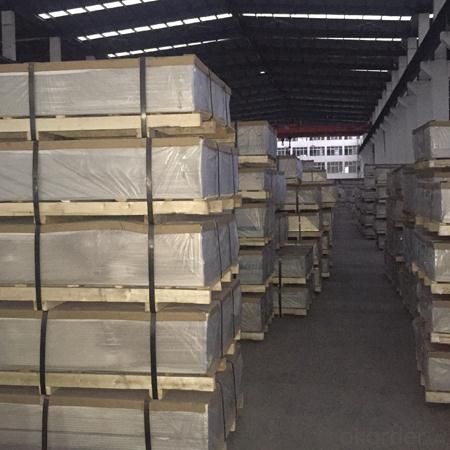
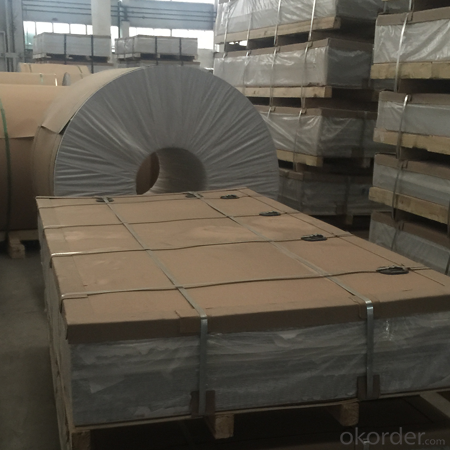
PVDF and PE Coated Aluminium Coils/Sheets
PVDF color pre coated aluminum coils/ sheets:
It is well known that fluorocarbon lacquer coating (PVDF coating) owes the best acid resistant/alkali and temperature tolerant capabilities of all painting materials. Being the best quality of precoated aluminum, PVDF coated coils are especially suitable for outdoor roofing walls and ceiling manufacturing.
Polyester (PE) color pre coated aluminum coils/ sheets :
Using high-grade polyester lacquer coating material, the finished coated coils are with delicate color uniform texture, color and diverse. It is the most popular and most common used materials in decorative usage. The PE coated aluminum are widely used in ACP( aluminum composite panel ) production and indoor ceiling usage.
FAQ
--Q: Do you provide free samples?
--A: Yes, free samples will be sent to you on freight at destination.
--Q: Can I get your latest products catalogue?
--A: Yes, it will be sent to you in no time.
--Q: What is the MOQ?
--A: 2 tons
--Q: What are your payment terms?
--A: We accept L/C, T/T.
--Q: What kinds of alloy can you supply?
--A: 1000 series: 1050, 1060, 1070, 1100, 1145, 1200
3000 series: 3003, 3004, 3105, 3104
5000 series: 5052, 5083, 5754, 5182
6000 series: 6061, 6063, 6062, 6063
8000 series: 8011, 8021
--Q: What kinds of temper can you supply?
--A: O-H112: O,H12,H14,H16,H18,H22,H24,H26,H,32,H34,H111,H112
T3, T4, T6
- Q: Can aluminum coils be used in solar panel systems?
- Solar panel systems can indeed utilize aluminum coils. Aluminum is commonly selected as the material for frames and supports in solar panels because of its favorable combination of lightness and strength. Its resistance to corrosion, durability, and impressive thermal conductivity make it an ideal choice for enduring severe weather conditions and efficiently dispersing heat generated by the panels. Furthermore, aluminum is highly recyclable, which aligns perfectly with the environmentally conscious nature of solar energy systems. In conclusion, incorporating aluminum coils into solar panel systems enhances their efficiency, lifespan, and eco-friendliness.
- Q: Can aluminum coils be used in HVAC heat exchangers?
- Yes, aluminum coils can be used in HVAC heat exchangers. Aluminum is a popular choice for heat exchangers due to its excellent thermal conductivity, light weight, and corrosion resistance. Aluminum coils are often used in air conditioning systems and heat pumps, where they transfer heat efficiently between the refrigerant and the surrounding air. Additionally, aluminum coils are easier to shape and form, allowing for more intricate designs and better heat transfer performance. Overall, aluminum coils are a reliable and effective choice for HVAC heat exchangers.
- Q: Can aluminum coils be used in the manufacturing of solar reflectors?
- Yes, aluminum coils can be used in the manufacturing of solar reflectors. Aluminum is a preferred material for solar reflectors due to its high reflectivity, low cost, and lightweight nature. It has excellent thermal conductivity and is resistant to corrosion, making it suitable for outdoor applications. Aluminum coils can be easily shaped and formed into the desired reflector shape, allowing for efficient concentration and reflection of sunlight onto solar panels or other solar energy systems. Additionally, aluminum is a sustainable material that can be recycled, further enhancing its environmental benefits in solar reflector manufacturing.
- Q: I read the back of my deodorant and it said that it contains 14% Aluminum. Is that harmful for my baby?
- I thought the answer was no, but wow after reading everyones response, i will assume i was wrong. I never would hav even thought of deodorant as being harmful. Hmmm I guess now I kow for the next time around. Thanks.. =)
- Q: Can aluminum coils be used in the production of aluminum doors?
- Aluminum doors can be produced using aluminum coils. Typically, aluminum coils serve as a raw material in the manufacturing process of aluminum doors. These coils are constructed from top-notch aluminum alloy and are available in varying thicknesses and widths. They can easily be molded into different shapes and sizes to fulfill the particular requirements of the doors. Furthermore, aluminum coils possess characteristics such as lightweightness, durability, and resistance to corrosion, making them an excellent option for door production. The coils are commonly subjected to various techniques like cutting, bending, and welding to fabricate the desired door components. All in all, aluminum coils offer numerous advantages in terms of versatility, strength, and aesthetics, which explains their popularity among aluminum door manufacturers.
- Q: Are there any restrictions on the coil thickness of aluminum coils?
- Yes, there are typically restrictions on the coil thickness of aluminum coils. The specific restrictions may vary depending on the intended application and industry standards. Generally, the thickness of aluminum coils is limited by the capabilities of the manufacturing equipment and the desired final product. Thinner coils are often preferred for applications that require flexibility, such as in the manufacturing of foils or flexible packaging materials. On the other hand, thicker coils are commonly used in industries like construction or automotive, where strength and durability are important factors. Additionally, the thickness of aluminum coils may be restricted by the availability and cost of raw materials. It is important for manufacturers to adhere to these restrictions to ensure the quality and performance of the final product.
- Q: Are aluminum coils suitable for weather-resistant applications?
- Yes, aluminum coils are suitable for weather-resistant applications. Aluminum is known for its excellent corrosion resistance, making it a popular choice for outdoor and weather-exposed applications. The metal forms a protective oxide layer on its surface when exposed to air, which acts as a barrier against moisture, humidity, and other weather elements. This oxide layer helps prevent the metal from rusting or deteriorating over time. Additionally, aluminum's lightweight nature and high strength-to-weight ratio make it a practical choice for various weather-resistant applications, such as roofing, gutters, siding, and outdoor signage.
- Q: What are the potential health risks associated with aluminum coils?
- Aluminum coils find common usage in HVAC systems due to their durability and excellent heat transfer properties. Although they are generally regarded as safe, there exist potential health hazards associated with aluminum coils if specific conditions are not met. One primary concern is the possibility of aluminum leaching into the air or water supply. Aluminum is a known neurotoxin, and prolonged exposure to it can result in various health problems, especially in individuals with pre-existing conditions like kidney disease or weakened immune systems. However, the quantity of aluminum that typically leaches from coils is minimal and unlikely to pose a significant risk to most people. Another potential health hazard pertains to the buildup of dust, dirt, and other particles on the aluminum coils. These particles can serve as a breeding ground for bacteria, mold, and other allergens, negatively impacting indoor air quality. If not adequately maintained and cleaned, these contaminants can lead to respiratory issues, allergies, and even infections in susceptible individuals. Moreover, aluminum coils can generate electromagnetic fields (EMFs) due to the electric currents passing through them. While the health effects of EMF exposure are still subject to ongoing research, certain studies indicate a potential connection between high levels of EMFs and specific health conditions, including cancer. However, it is essential to note that the levels of EMFs emitted by aluminum coils are generally deemed to be within safe limits and unlikely to present significant health risks. To mitigate these potential health hazards, it is crucial to ensure proper maintenance and cleaning of aluminum coils. Regular inspections, professional cleaning, and frequent air filter changes can help prevent the buildup of contaminants and maintain good indoor air quality. Additionally, it is advisable to consult with HVAC professionals to guarantee proper installation and maintenance of the coils, minimizing the risk of aluminum leaching or excessive EMF exposure. In conclusion, although potential health risks are associated with aluminum coils, they are typically considered safe when adequately maintained. By taking necessary precautions and adhering to recommended maintenance practices, it is possible to minimize any potential health concerns related to aluminum coils in HVAC systems.
- Q: Can aluminum coils be utilized in the process of welding?
- <p>Yes, aluminum coils can be used for welding work. They are commonly used as filler material in processes like MIG (Metal Inert Gas) welding. Aluminum welding requires specific techniques and equipment due to its high thermal conductivity and the need for shielding from oxidation. The aluminum coils must be of good quality and compatible with the welding process to ensure a strong and durable weld. Proper selection of welding parameters, such as amperage and voltage, is crucial for successful aluminum welding.</p>
- Q: Calculate the specific heat of aluminum (in calories).mass of aluminum25.0 gmass of water23.2ginitial temperature of aluminum98.0Cinitial temperature of water20.0Cfinal temperature of water33.0Cround to three decimal places, do not include units.
- Heat gained by water = heat lost by aluminum Heat = H mass = m specific heat =c change in temperature = dT H = mcdT mcdT for water = mcdT for Al (23.2)(1.00)(13) = (25.0)(c(Al))(33-98) c(Al) = (23.2)(1.00)(13)/(25.0)(65) = 0.186 This value is just a bit below the known value of specific heat for aluminum, where c = 0.217 cal/g.C
Send your message to us
Hvac Aluminum Coils for Table Panel - Color Coated Aluminium Coil
- Loading Port:
- Shanghai
- Payment Terms:
- TT OR LC
- Min Order Qty:
- 3 m.t.
- Supply Capability:
- 60000 m.t./month
OKorder Service Pledge
OKorder Financial Service
Similar products
Hot products
Hot Searches
Related keywords
